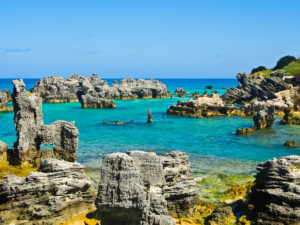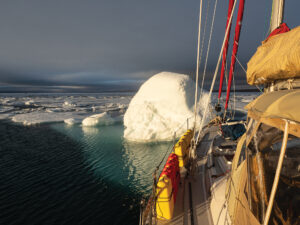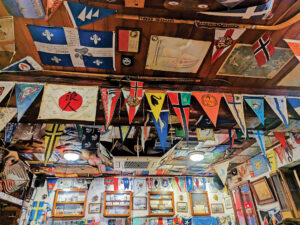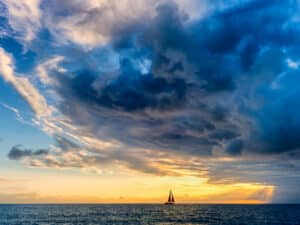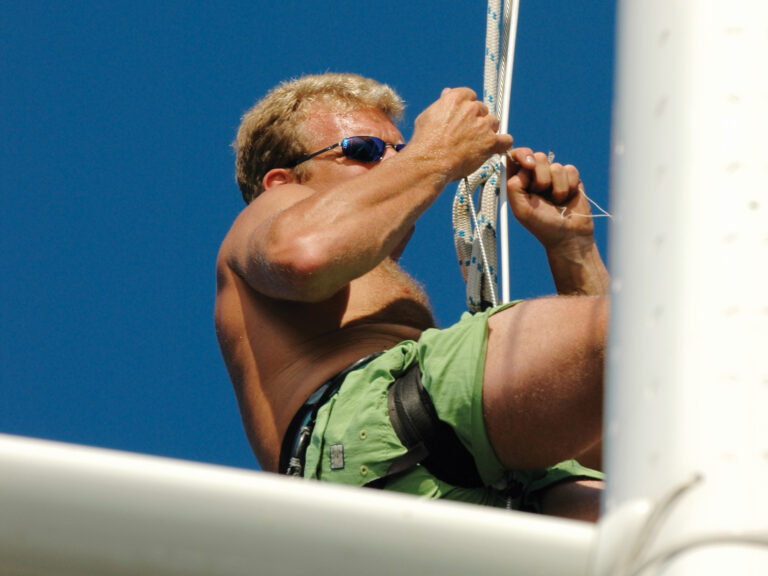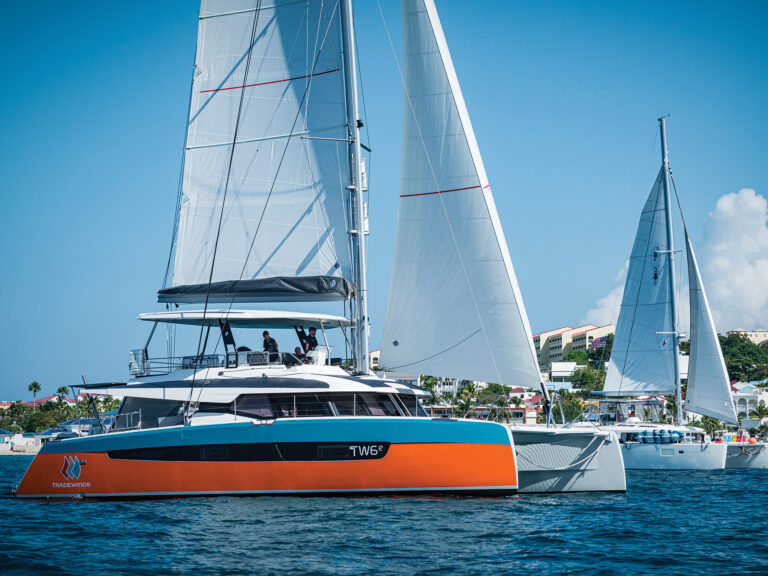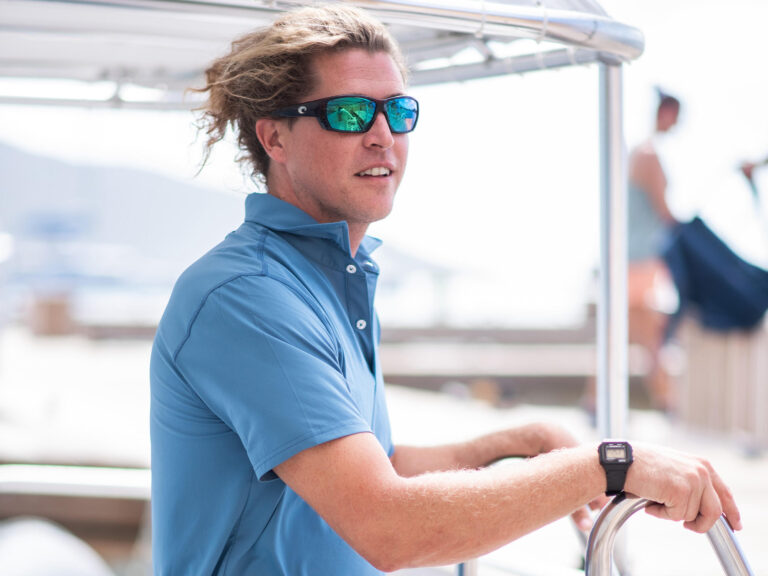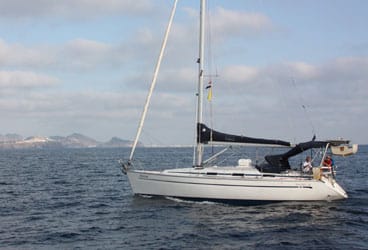
Baksheesh
I’m often accused, as a journalist and as a man, of being a bit too starry-eyed. I understand this criticism, and I think it has merit. I do tend to put a good spin on things. I’m an optimist. I’m happy with my life. Occasionally, however, a seasoned sailor lives through an experience so, well, so unfortunate that tears are the only compassionate response.
But now my tears are dry. And I reach for my pen.
Quite recently, my wife, Carolyn, and I transited the Suez Canal. It was a dreadful experience, the details of which will appear sometime soon in a feature article in this magazine. At the end of that stressful transit, as Wild Card‘s bow dipped into the first Mediterranean swell, I said, “I will never, ever, go back to Egypt for any reason.”
In my 50 years of offshore cruising, I’d never had occasion to say that about any other destination.
Two weeks later, while they were approaching Isma’iliya, Egypt, located midway through the Suez Canal, my friend Robert Wasilewicz, a Polish-born Australian citizen aboard the Bavaria 38 Shirena, clutched his chest and said to his wife, Tina, a trained nurse, “Gee, I have terrible heartburn.”
Indeed, transiting the Suez Canal is enough to give you a heart attack. And to make a long story short, Robert had one. Luckily, it didn’t kill him. But it was a major attack that damaged a lot of heart muscle. He ended up being barely stabilized in the Suez Hospital in Isma’iliya with only 43 percent of his normal blood flow. To survive, he desperately needed heart surgery to install a fibrillating pacemaker. To top it all off, his pristine Shirena had been hastily anchored in a very exposed location in the canal, and, sadly, the landsharks were already beginning to circle.
Now I happen to love Robert. I haven’t known him very long, only a year or so, but he is, simply put, a prince of a man. He is kind and true and faithful and caring—in short, he’s a man I admire greatly, the kind of man I aspire to be.
He found me via email in Israel and asked if a mutual friend, Tom Sampson, and I would swoop in and rescue his boat, the only valuable asset Robert has in this world.
Now I could’ve told Robert that I loved him but it wasn’t convenient, that it was the premier of Iron Man 2, so I couldn’t really do it, so sorry.
But I’m not that kind of guy. In some ways, I wish I were, but I’m not. A good man needed me. Therefore, I found myself—only a few weeks after I’d escaped it—flying back into the place I disliked most in the world.
My plan was to step aboard, pretend to be Robert, accept the pilot, transit to Bur Sa’id, ditch the pilot, and continue out of the wretched country without a stop. Yes, I intended to break the law (gasp!) in order to minimize opportunities on the part of ravenous Suez Canal officials in search of excessive baksheesh—what we call a bribe.
This would’ve worked fine, but Robert’s agent somehow became involved and demanded an additional US$350 to grease the right palms to make this happen “legally,” a term that is laughable in the context of Egypt. And, oh yeah, a security bond of 4,000 Egyptian pounds (US$810) had to be paid, too. “Don’t worry, refundable!” said the agent with a smile.
Robert, clutching his chest in the hospital and waiting to be evacuated by air to Austria for his heart operation, paid.
Tom and I were to fly in at 0400, pick up the Change of Captain paperwork at 0700, the canal pilot at 0800, and, we hoped, be out of Egypt and into the Med by 1500.
We confirmed all this just before we took off from Israel.
It didn’t quite work this way. The agent took the money, bowed deeply to show his great appreciation, but did nothing. When we showed up, he assured us that we’d leave at 0800, although he knew we wouldn’t, because none of the paperwork had been done. By 1100, we were frantic to leave. It was then that the agent called us and said, “A warship is transiting, and thus you’re unable to go today.”
This is the S.O.P. excuse, which works perfectly because you can’t refute it. We didn’t leave the following morning, either. Our pilot was promised at 0800, just as before, but nothing happened. The hours ticked by. Robert was discharged from the hospital and whisked to a hotel room to rest for his upcoming transfer flight.
At noon, the agent called us and said there was a problem. “It will take about, oh, another week to complete the paperwork.”
Now we were in shock. We concluded that more and more people had learned that there was a boat with a skipper who’d had a heart attack and that the boat had two delivery crew aboard who wanted to leave immediately. These ever-willing opportunists started to rub their hands together with glee: a perfect opportunity for baksheesh. Perfect!
I was getting worried. I knew we had to get the boat out of Egypt soon or it would be—picked clean? Looted? Stripped? Impounded? Sued? Damaged? Seized? Auctioned? Whatever?
I began to clutch my chest. Damn!
We couldn’t steal the boat in the dead of night because you can’t transit the second half of the Suez Canal without a pilot. We were at the mercy of the circling vultures.
We contacted a high official of the Suez Canal Authority through an interpreter and explained that we were merely poor crew with empty pockets. We said Robert had just had a very real heart attack and might have another at any second. And the interpreter said the official said, “None of this is my problem. I’m a busy man. It will take a week to complete the paperwork to transfer crew. Now stop bothering me!”
The agent then proposed a compromise: With Robert aboard as official captain, the vessel could continue on its way to Bur Sa’id, where he’d depart and we’d take over. I didn’t like it, but Tom and I agreed, at Robert’s urging. He was desperate to save his boat. His breathing was getting heavier by the second.
Then, when Robert and the pilot showed up, Tom and I were unexpectedly ordered off the boat because we weren’t “registered crew.” I didn’t know that such a designation existed. So Robert, fresh from his hospital bed and heart attack, and his damped-eyed wife, Tina, were forced to shove off with only the greedy pilot aboard. Meanwhile, we were left ashore, dumbfounded and open-mouthed on the quay.
I couldn’t believe this was happening. I pinched myself. It didn’t seem possible. No group of human beings could be this callous. It was like a bad joke, a nightmare. I know this sounds unbelievable, so I’ll rephrase as clearly and concisely as I can: the Suez Canal Authority forced a skipper who was virtually in the process of having a heart attack to go to sea with one of its greedy employees aboard and badgering him for an ever-bigger bribe.
I must say I had an extremely low opinion of the Suez Canal Authority before and it plummeted even further after this bit of cold-hearted treachery.
Tom and I sort of ran alongside Shirena—drove, actually—while it transited the 40 miles of drainage sewer, a.k.a. the Suez Canal, with a shaking, quaking Robert strapped to the helm.
I was literally praying he wouldn’t die along the way.
Needless to say, we were absolutely apoplectic. This is exactly what we’d come so far and worked so hard and paid so much money to avoid.
In Bur Sa’id, at the northern mouth of the Suez Canal, is something called the Port Said Yacht Club. Alas, this isn’t a club at all, merely another, completely different group of criminal thugs, and they were eagerly waiting their turn at the heart-attack victim.
Tom and I rushed there to make sure things would go smoothly, but they were ready for us—so ready, in fact, that they were actually grinning as they suggested that we might be international terrorists attempting to bomb the canal. We were forced to go to the police station to get a piece of paper attesting to our high moral fiber, and three of the thugs happily came along with us to help distribute the baksheesh. “Oh, how helpful,” I said through gritted teeth.
When Shirena arrived, she was swarmed by Suez Canal officials looking for their pieces of the action. The pilot wouldn’t get off, saying that his 100-Egyptian-pound bribe (US$20) and the cigarettes and the bottle of booze weren’t nearly enough.
Robert looked stricken. He was staring at the cockpit floor. He was unsteady on his feet. Tom, a former R.A.F. fixed-wing pilot, lost it and started screaming at the canal pilot, telling him that he was unbelievably callous and greedy. Such was Tom’s righteous anger that the pilot leaped off the boat and almost made the mistake of walking between me and the water but realized it, alas, at the very last moment.
Then we were all ordered off the boat while the agent and various Suez minions decided who could go next for a dip in the baksheesh trough.
Robert said, oh so softly, “I’m having pains.” Tina started crying, frantically rummaging through her purse and luggage for his emergency nitro pills.
The agent came over and told me what a nice guy he was and how lucky it was for us that he was here to help. I looked at him. At this point, I didn’t trust myself to speak. I turned back. Robert was looking sheepish, as if to apologize that his dying was so inconvenient for so many. Tina looked up at him with love, tears streaming down her youthful, freckled face.
I hugged her, hard. She was quaking. I reached over and rubbed Robert’s shoulder. I smiled at him. He smiled back; such grace under pressure. Tom was shouting for more photocopies. The agent was jovially slapping a kibitzing guy with a gun on the back. The Suez Canal official was clucking yet again over the paperwork. “You really should be more organized,” he said. Yes, he actually said exactly that, and I barked a strangled laugh.
I felt like I was in an old black-and-white movie and that Bogie might appear around the corner to save us from these jackals. Next thing we knew, we were all in a car, dashing along the streets to yet another official in need. Then we were finished. Finally, it was over, and we were hugging Tina and Robert, who were about to be whisked to the airport.
Tom and I sprinted through the darkened streets of Bur Sa’id in a mad rush to escape. We rounded the corner to the boat and Tom shouted, “I’ll get the bow line!” Not wasting a second, I shouted, “I’ll get the stern!”
That’s when a shadow parted from the wall and said firmly, “You can not move this vessel until I say so. There is a problem with your paperwork.”
It seemed like it would never end. Somebody had screwed up, apparently, and this guy hadn’t been greased or greased enough. He was holding his hand up to stop us, like a stern traffic cop. Meanwhile, we shouted into cellphones, calling all of our newfound official friends to have them call him off. He was a relative small fry, I was sure.
Then his cellphone rang, and he suddenly looked sad as he listened speechlessly to the voice on the other end. “You’re free to go,” he said, “just as soon as you call for your pilot.”
We didn’t want or need a pilot. Normally, only two are required to transit the canal; this would be our third. “Fine,” we said. I started babbling away as loudly as I could and nodded slyly at Tom. He went below and fiddled with the VHF. Without keying the mic, he loudly called Harbor Control, then dashed back on deck and said, “We’re cleared to go!”
The guy grinned evilly and displayed the handheld VHF I hadn’t seen clipped to his belt. “No, you aren’t!” he hissed. “I’m listening! Do you take me for a fool? Call for a pilot!”
I stopped myself from saying, “Not a fool. A thug.”
We truly didn’t need a pilot. We were only a few hundred meters from the Suez Canal’s end. We were already beyond where I’d dropped my second pilot from Wild Card only a few weeks earlier.
“Call them!” he ordered.
We called and told them flat out that we had no more money for bribes. We told them this forthrightly, plainly, on the VHF radio, for the world to hear. “We don’t have any more money or cigarettes or booze or gifts. Nothing. You’ve taken it all. We’re just empty. We’re drained, penniless. Please let us go!”
The authorities ordered us to wait.
It took another half an hour for the pilot boat to swing alongside. We pulled away from the dock. The night was pitch black. Commercial harbor traffic was dense. Our pilot seemed quite chipper. “A present for me?” he asked.
“No!” I shouted. “No! No! No, no, no!”
“You offer your pilot nothing?” he asked, amazed, is if we were turning down a chance to contribute coins to Mother Theresa.
“Nothing!” I screamed and left the helm without a thought in my head. I was seeing red. Finally, I had one, alone. I was quaking. My fists were clenching and unclenching. “Not one f$&@#*! thing!”
I felt Tom’s hand on my shoulder, and I reluctantly returned to the helm.
Within three minutes of stepping aboard, our pilot was gone. I braced to take evasive action if the pilot boat attempted to ram us, as they’d done to the German yacht Blue Pearl a few weeks previous, but they faded into the night. It was 2245.
I believe the open sea had never looked so inviting.
In an update, Fatty reports that “_Shirena is now tied up at the Ashkelon Marina in Israel. Tom and I are still wandering the docks like lunatics, attempting to stop ranting. Robert is under the knife in Austria. His heart attack had been much more severe and, perhaps, prolonged than we’d previously thought. And I’ll never say ‘never’ again.”_

